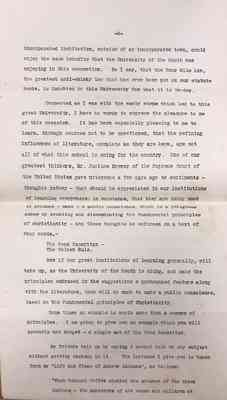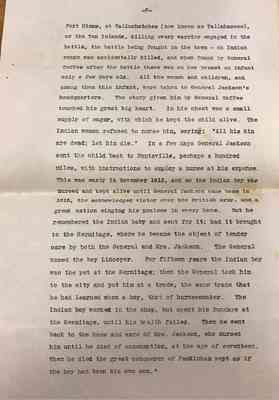Pages
6
incorporated institutions, outside of an incorporated town, could enjoy the same benefits that the University of the South was enjoying in this connection. So I say, that the Four Mile Law, the greatest anti-whisky law that has ever been put on our statute books, is indebted to this University for what it is today.
Connected as I was with the early steps which led to this great University, I have no words to express the pleasure to me of this occasion. It has been especially pleasing to me to learn, through sources not to be questioned, that the refining influences of literature, complete as they are here, are not all of what this school is doing for this country. One of our greatest thinkers, Mr. Justice Brewer of the Supreme Court of the United States gave utterance a few days ago to sentiments - thoughts rather - that should be appreciated in our institutions of learning everywhere: in substance, that they are doing much to produce - make - a public conscience, which in a religious sense by creating and disseminating the fundamental principles of Christianity - and these thoughts he enforced on a text of four words, -
The Good Samaritan - The Golden Rule.
Now if our great institutions of learning generally, will take up, as the University of the South is doing, and make the principles embraced in the suggestions a pronounced feature along with the literature, they will do much to make a public conscience, based on the fundamental principles of Christianity.
Some times an example is worth more than a sermon of principles. I am going to give you an example which you will probably not forget - a single act of the Good Samaritan.
My friends twit me by saying I cannot talk on any subject without getting Jackson in it. The instance I give you is taken from my "Life and Times of Andrew Jackson", as follows:
"When General Coffee checked the advance of the Creek Indians - the murders of 400 women and children at
7
Fort Mimms, at Tallushatches (now known as Tallahassee), or the Ten Islanders, killing every warrior engaged in the battle, the battle being fought in the town - an Indian woman was accidentally killed, and when found by General Coffee after the battle there was on her breast an infant only a few days old. All the women and children, and among them this infant, were taken to General Jackson's headquarters. The story given him by General Coffee touched his great big heart. In his chest was a small supply of sugar, with which he kept the child alive. The Indian women refused to nurse him, saying: "All his kin are dead; let him die." In a few days General Jackson sent the child back to Huntsville, perhaps a hundred miles, with instructions to employ a nurse at his expense. This was early in November 1813, and so the Indian boy was nursed and kept alive until General Jackson came home in 1815, the acknowledged victor over the British army, and a great nation singing his praises in every home. But he remembered the Indian baby and sent for it; had it brought to the Hermitage, where he became to object of tender care by both General and Mrs. Jackson. The General named the boy Lincoyer. For fifteen years the Indian boy was the pet at the Hermitage; then the General took him to the city and put him at a trade, the same trade that he had learned when a boy, that of harnessmaker. The Indian boy worked in the shop, but spent his Sundays at the Hermitage, until his health failed. The he went back to the home and care of Mrs. Jackson, who nursed him until he died of consumption, at the age of seventeen. When he died the great conqueror of Packinham wept as if the boy had been his own son."

